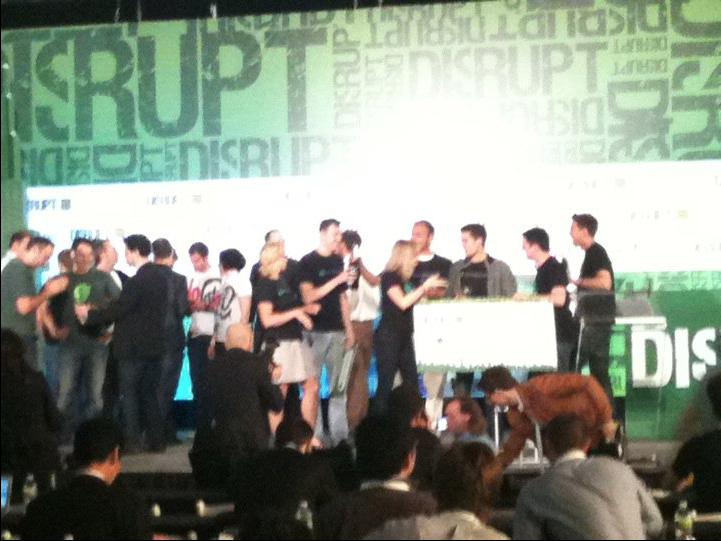Cheers and Jeers for TechCrunch Disrupt NYC

Having just attended the TechCrunch Disrupt Conference in New York I have some thoughts to share. There were way more good things than bad at TC Disrupt NYC. I go to dozens of conferences every year, but this one was significantly more substantive than SXSW, SES and Ad:tech combined.
I will start with the positives.

TechCrunch Disrupt Winner: Getaround
Cheers
Overall I can say the speakers, contributors and people attending were top notch. Two people I ‘d always heard good things about were Paul Graham and Marissa Mayer.
The Coolest Graham Cracker
I never fully grokked how awesome Graham was until seeing him do a segment called ‘office hours’. A few lucky startups got to grab some time on stage with Paul and pick his brain and sometimes vice versa.
Perhaps most know Paul Graham as the ‘Y Combinator guy’, but did you know where he came from? He wrote what later became Yahoo stores. Graham understood that adaptability is the key to startup success, so he chose a slow, dead language that no one used anymore…
KIDDING! But that’s what everyone really thought about LISP at the time. As another LISP fan (I actually own a copy of the Little LISPer…), I was excited Paul Graham’s got a reimagined language called Arc and it is an updated dialect of LISP. It’s always cool to see diamonds mined out of the dustbin. Graham said that one can predict the life of a startup based on the language chosen. Wow. The beauty of LISP is its simplicity. LISP is still kinda under the radar, but to those in the know it is a special brew of secret incantations and magical concoctions.
The syntax is deceptively simple (did you know that XML can be represented by LISP code and it’s shorter?), and you can use macros to change the language on the fly…Who needs a preprocessor?
LISP has been taking out the trash since 1959, when Java was just in diapers (yes, LISP invented garbage collection). Just sayin’…
And did you think closures were something Javascript stole from pop psychology? No, they also came from LISP, rather than Dr. Phil. It is more powerful than PHP, Java, Python, Ruby and C++. And when used properly, as fast as C. You like objects? What about META-objects?
Mayer of Yourtown, USA
Marissa Mayer was my other favorite speaker. I was fortunate enough to grab a few moments with her. During our brief chat a slew of other women came up to give accolades. Most of the women spoke about how they looked up to Mayer as a woman in technology and that she was a role model. I totally agree Mayer is a leader, but to me the least interesting thing about her is that she is a woman. She was the engineer that once led the user interface and web server teams and is considered responsible for the success of the Gmail and Google Search UIs. When Mayer became the VP of Google, one of her objectives was to streamline the many brands within the GEO product line (Places, Social, Local, and so on).
Google just closed over 200 million installs of Maps for Mobile (active ones). Additionally, 20% of searches on Google overall are for something local. Google strives to make search results more relevant by connecting people to the information they seek. With a quiet coolness, her apps have become the crown jewel of Google.
The android was largely left out at the conference, however it continues to be a vital part of Google’s strategy. There was a lot more focus on the iPhone at TC Disrupt.

Annedroid 🙂
Twit Cheers
During the entire conference there was constant twitter action for the #TCDisrupt trending topic. Not only was the action from conference attendees, it was from people watching the live stream. COOL! That part was really fun. I often enjoy twitter interaction while attending live events, because it gives one a chance to chat with fellow attendees in a non-threatening way. I also know that Michael Arrington and others on stage were watching the stream. Double cool. It’s also nice for the ego when you get the occasional RT. 😀
My two favorite companies were Sonar and BillGuard.
Sonar is a mobile application that gives you information about how you are connected to others in the room. Assuming you know and trust the people in your network, sonar could provide easy introductions at otherwise lonesome events. I watched various geeky types use the application during the conference to make connections, it seemed to work for them. My only concern is potential privacy issues, the same ones that go for just about every geo-location based app out there. It’s up to the individual to govern his/her contacts closely. I think a way to do a little quality control is to not give a number attached to contacts, so there would be no gaming for numbers like there is with many social networks.
BillGuard is a service offering the automation and detection of potential credit card misuse. Predictive algorithms identify hidden charges, errors in billing and they even claim to tell you about forgotten subscriptions. I was pretty amused when the presenter for BillGuard quoted a statistic about 70% of AOL users not even realizing they were still subscribed to the service. Did he not know one of the judges of his session was from Huffington Post Media Group / AOL Ventures? Ha! That was pretty priceless. I like the concept of people being able to get help with invalid credit card charges, but ultimately it falls back on the consumer to dispute any charges…
Jeers
The $50,000 prize went to a company called Getaround that already took $1.5 million in funding, so they received less than 4% of what they already had. The prize money was more about making everyone feel good. Getaround demoed their product with a Tesla, which by the way costs more than $50k. If you wanted to disrupt then maybe give the credit and accolades to the already funded while saving prize money for those who weren’t funded.. Why not Disrupt the competitive startup mentality by having them help each other!? The winner of the contest could pick their favorite startup to give money to? Perhaps mentor-ship could have been encouraged on a deeper level.
They were very clear about who was sponsoring what and so forth. However the content felt commercial at some points. Overall the companies presenting seemed to be offering lots of vitamins not many pain killers. Call me crazy, but not enough of the apps I saw will make life better for small businesses. There were some cool b2b apps, but by far it seemed weighted towards b2c.
Once or twice the audience was asked for questions. I am still kicking myself for not standing up when I could’ve asked a question to Roelof Botha of Sequoia Capital and Michael Arrington. Everyone else froze up too. It was unexpected and random. The level of interaction was mostly via tweets. One other time the crowd was asked for pitches to get an electric motorcycle. A lady with a son she wanted to keep out of the military got the bike. Many of the other bike winning hopefuls did weird company pitches. In those cases Arrington just yelled “NEXT.” The group interaction was just awkward. At times Mr. Arrington was sort of disinterested on stage, even bemused. When a marriage proposal happened right before a fireside chat with his interviewee it took Arrington a full minute or two to process it, which I understand completely. However, what kind of man would steal his lady’s thunder like that at such a major career milestone?!

